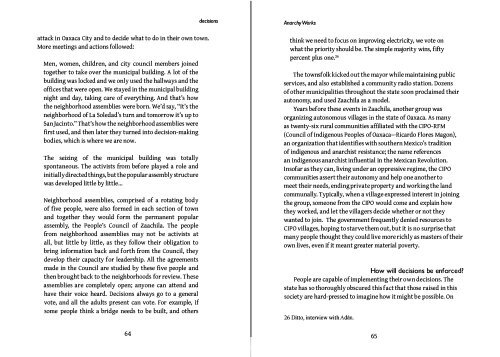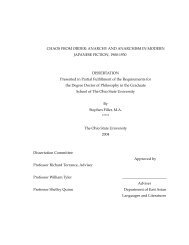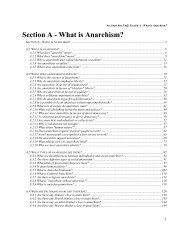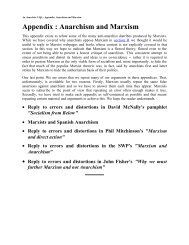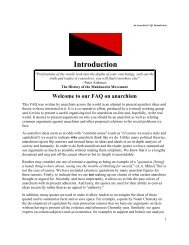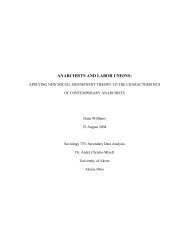Anarchy Works.pdf - Infoshop.org
Anarchy Works.pdf - Infoshop.org
Anarchy Works.pdf - Infoshop.org
You also want an ePaper? Increase the reach of your titles
YUMPU automatically turns print PDFs into web optimized ePapers that Google loves.
decisions<br />
<strong>Anarchy</strong> <strong>Works</strong><br />
attack in Oaxaca City and to decide what to do in their own town.<br />
More meetings and actions followed:<br />
Men, women, children, and city council members joined<br />
together to take over the municipal building. A lot of the<br />
building was locked and we only used the hallways and the<br />
offices that were open. We stayed in the municipal building<br />
night and day, taking care of everything. And that's how<br />
the neighborhood assemblies were born. We'd say, "It's the<br />
neighborhood of La Soledad's turn and tomorrow it's up to<br />
San]acinto." That's how the neighborhood assemblies were<br />
first used, and then later they turned into decision-making<br />
bodies, which is where we are now.<br />
The seizing of the municipal building was totally<br />
spontaneous. The activists from before played a role and<br />
initially directed things, but the popular assembly structure<br />
was developed little by little ...<br />
Neighborhood assemblies, comprised of a rotating body<br />
of five people, were also formed in each section of town<br />
and together they would form the permanent popular<br />
assembly, the People's Council of zaachila. The people<br />
from neighborhood assemblies may not be activists at<br />
all, but little by little, as they follow their obligation to<br />
bring information back and forth from the Council, they<br />
develop their capacity for leadership. All the agreements<br />
made in the Council are studied by these five people and<br />
then brought back to the neighborhoods for review. These<br />
assemblies are completely open; anyone can attend and<br />
have their voice heard. Decisions always go to a general<br />
vote, and all the adults present can vote. For example, if<br />
some people think a bridge needs to be built, and others<br />
think we need to focus on improving electricity, we vote on<br />
what the priority should be. The simple majority wins, fifty<br />
percent plus one.26<br />
The townsfolk kicked out the mayor while maintaining public<br />
services, and also established a community radio station. Dozens<br />
of other municipalities throughout the state soon proclaimed their<br />
autonomy, and used Zaachila as a model.<br />
Years before these events in Zaachila, another group was<br />
<strong>org</strong>anizing autonomous villages in the state of Oaxaca. As many<br />
as twenty-six rural communities affiliated with the CIPO-RFM<br />
(Council ofIndigenous Peoples of Oaxaca-Ricardo Flores Magon),<br />
an <strong>org</strong>anization that identifies with southern Mexico's tradition<br />
of indigenous and anarchist resistance; the name references<br />
an indigenous anarchist influential in the Mexican Revolution.<br />
Insofar as they can, living under an oppressive regime, the CIPO<br />
communities assert their autonomy and help one another to<br />
meet their needs, ending private property and working the land<br />
communally. Typically, when a village expressed interest in joining<br />
the group, someone from the CIPO would come and explain how<br />
they worked, and let the villagers decide whether or not they<br />
wanted to join. The government frequently denied resources to<br />
CIPO villages, hoping to starve them out, but it is no surprise that<br />
many people thought they could live more richly as masters of their<br />
own lives, even if it meant greater material poverty.<br />
How will decisions be enforced?<br />
People are capable of implementing their own decisions. The<br />
state has so thoroughly obscured this fact that those raised in this<br />
society are hard-pressed to imagine how it might be possible. On<br />
26 Ditto, interview with AdM.<br />
64<br />
65


